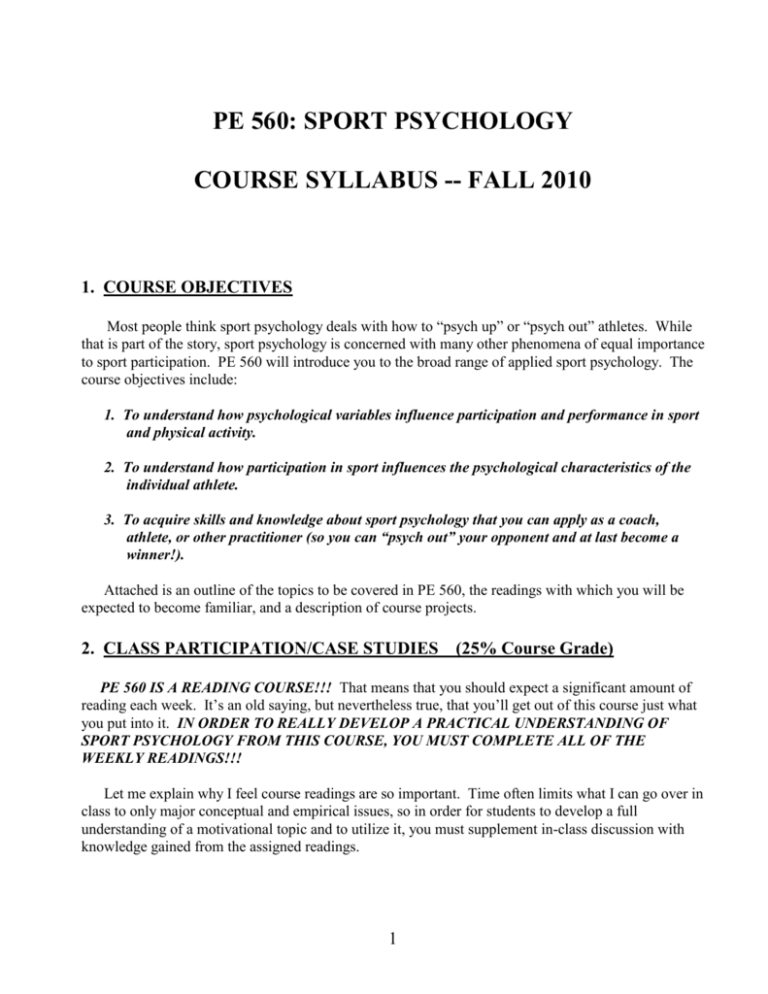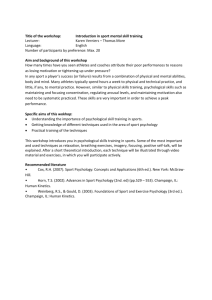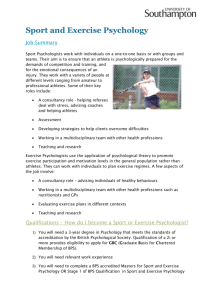pe 560: sport psychology
advertisement

PE 560: SPORT PSYCHOLOGY COURSE SYLLABUS -- FALL 2010 1. COURSE OBJECTIVES Most people think sport psychology deals with how to “psych up” or “psych out” athletes. While that is part of the story, sport psychology is concerned with many other phenomena of equal importance to sport participation. PE 560 will introduce you to the broad range of applied sport psychology. The course objectives include: 1. To understand how psychological variables influence participation and performance in sport and physical activity. 2. To understand how participation in sport influences the psychological characteristics of the individual athlete. 3. To acquire skills and knowledge about sport psychology that you can apply as a coach, athlete, or other practitioner (so you can “psych out” your opponent and at last become a winner!). Attached is an outline of the topics to be covered in PE 560, the readings with which you will be expected to become familiar, and a description of course projects. 2. CLASS PARTICIPATION/CASE STUDIES (25% Course Grade) PE 560 IS A READING COURSE!!! That means that you should expect a significant amount of reading each week. It’s an old saying, but nevertheless true, that you’ll get out of this course just what you put into it. IN ORDER TO REALLY DEVELOP A PRACTICAL UNDERSTANDING OF SPORT PSYCHOLOGY FROM THIS COURSE, YOU MUST COMPLETE ALL OF THE WEEKLY READINGS!!! Let me explain why I feel course readings are so important. Time often limits what I can go over in class to only major conceptual and empirical issues, so in order for students to develop a full understanding of a motivational topic and to utilize it, you must supplement in-class discussion with knowledge gained from the assigned readings. 1 2.1 CASE STUDIES To provide more of a hands-on flavor to the class, we’ll have you complete 15 case studies throughout the semester that will comprise a good portion of your class participation grade. Make two copies of each case study, the first to hand in at the beginning of class and the second to use as part of our small group discussion. Case study points cannot be made up, so you must be in class that day (i.e., or have a university-sponsored excuse) and case studies must be turned in at the beginning of class to receive any points. 3. COURSE EVALUATION The Final will be an open-book, open-note essay exam, comprised of approximately one 30-point, six 20-point, and four 10-point questions, and students will have some choice about the 10 questions they answer from the pool of 17-18 questions. Your final semester grade will be computed as follows: 3.1 Final Exam 35% 3.2 Course Projects (a) Term Paper (b) Mental Skills Miniprojects 40% 15% 25% 3.3 Class Participation/Case Studies 25% ___________________________________________________________________________ TOTAL 100% 4. COURSE PROJECTS Two course projects will be required for PE 560, totaling 45% of your course grade. This strong emphasis on course projects reflects not only a desire to educate you about the psychological aspects of sport but also a commitment to help you apply your knowledge in meaningful and practical ways, whether you are a physical educator, coach, recreation specialist, athlete, or aspiring sport psychologist. 4.1 PSYCHOLOGICAL SKILLS MINIPROJECTS (25% Course Grade) Five times throughout the course, students will conduct 1-2-week-long miniprojects in order to gain “hands-on” experience about a specific course topic or psychological skill being studied. Handouts specifying specific details of each project will be provided when assignments are made. All assignments will culminate in a written minipaper describing the results of the individual project and are due at the beginning of the class period on the due date. All projects are selected to not only further you knowledge of course content, but to also be of practical relevance to you. For example, during our discussion of “personal science,” students will familiarize themselves with the problem-solving process 2 by conducting diet/weight control, exercise and/or time management projects. For the diet/weight control miniproject, students will record their eating and exercise patterns for one week, develop alternate strategies to change those patterns in some meaningful way, and finally choose the best alternatives and try them out during Week 2. Possible miniproject topics include: 1. Competition/Personality 2. Motivation 3. Personal Science 4. Imagery/Physical Relaxation 5. Self Talk 4.2 TERM PROJECT & ORAL REPORT (20% Course Grade) The Term Project is one larger project that you will work on all semester. For the Term Project, you have three options to choose from: (a) a Literature Review, (b) a Coach Project, or (c) an Athlete Project. First, the Lit Review requires you to choose a sport psychology topic of interest to you, review all the relevant research on the topic, and writeup that Review along with practical implications for the practitioner. The latter two options allow you to choose a program for implementing Mental Skills Training (MST) based on whether your MST needs are primarily those of a program developer such as a physical educator/coach or those of a participant such as an athlete or other individuals desiring personal change. Select ONE of these three options that are described more fully below. A Term Project prospectus will be due Wednesday, September 29. 4.2.1 LITERATURE REVIEW: If you choose this option, you will select a topic in sport psychology and review the available research literature (i.e., professional journals such as Journal of Sport and Exercise Psychology, The Sport Psychologist, Journal of Sport Behavior, International Journal of Sport Psychology, and Journal of Applied Sport Psychology). From the findings of your review of relevant theory and research, you are to develop implications that would be useful to the practitioner such as coaches and athletes. Your written term paper therefore will consist of two parts: (a) a review of the scientific literature, and (b) implications for the practitioner. Your 15-minute oral report will present only the implications, and you will deliver the report as if you were addressing the target population for which your implications are intended (e.g., coaches). The written report shall consist of not more than 14 typed, double-spaced pages. You are responsible for providing each member of the class who wants one with an electronic copy of your paper as well as turning in two copies to me, one I will keep and the other I’ll return with my comments. Due date for the paper as well as the 15-minute oral presentations is Wednesday, December 1. 4.2.2 COACH’S PROGRAM: If you choose this option, your role will be primarily that of a program developer. You will be asked to design a season-long MST program for yourself (i.e., self change program), your PE class, your exercise class or team you coach. The MST program must be geared for a specific age level and activity/sport and detail exactly what you would do and how you would do it. That is, you will need to specify (a) what mental skills you have included, (b) what priority you have established for teaching those skills, and (c) your rationale for the decisions you made. Next you need to construct a complete seasonal/yearly practice plan for group and/or individual MST practice. This plan should include what types of practice exercises you would use, how much practice time you would employ for each, and how the focus, volume, and intensity of training would change throughout the program. Finally, you should include how you will monitor individual practice and assess progress in skill development. Evaluation of this project will be based on a typed, doublespaced paper of at least 8 but not more than 15 pages that outlines your program including sample 3 lesson plans. This paper is due Wednesday, December 1 and your oral presentation will be made the same day. You are also responsible for making an electronic copy of your paper for all class members who want one as well as submitting 2 copies to me, one I will keep and the other I’ll return with my comments. 4.2.3 ATHLETE’S PROGRAM: If you select this option, your role will be primarily that of a participant. Choose this option only if you want to create positive personal change because you will carry out your own psychological skills improvement program by selecting and practicing two or more of the mental skills studied in class for a one-month time period. This type of hands-on self-study should greatly supplement your understanding of Mental Skills Training and hopefully help motivate you to put your knowledge into practice once the course has ended. The MST self-improvement option will be completed individually in direct consultation with me. You will be required to: (1) Practice at least two mental skills a minimum of 10 minutes daily for one month. Last day to start this project is November 8. (2) Monitor your progress in developing mental skills by keeping a daily log of your practice that you will turn in at the conclusion of the project along with your reaction paper. (3) Meet with me once a week to practice skills, monitor progress, and troubleshoot problem areas. (4) Write a 3-10-page “reaction paper” describing your thoughts, feelings, and experiences with your Personal MST Program. Your paper is due Wednesday, December 8. (5) Make a 12-15-minute presentation on the mental training program you developed, how you implemented the program, and how you evaluate its effectiveness. If possible, pre- and post-testing will be conducted to determine the effectiveness of your Personal MST Program. Grading will be roughly one-third on effectiveness of the program, one-third on daily practice and log-keeping, and one-third on your reaction paper and general cooperation and effort on the project. This option involves more on-going time and effort and is therefore more geared to individuals who are serious about self-improvement in a specific area. Nevertheless, it is open to anyone in the class who is willing to make a firm commitment to mental skills training. Further information on the MST Program can be gained by talking with me directly. EACH STUDENT IS REQUIRED TO SUBMIT A TERM PROJECT PROSPECTUS BY SEPTEMBER 22. SUBMIT 2 COPIES OF YOUR REACTION PAPER. I WILL KEEP ONE AND RETURN THE OTHER TO YOU WITH MY COMMENTS. 4 5. KEY POINTS (10% Course Grade) I give difficult exams and students in the past have asked both how to better prepare for the exams and whether they could do extra work to bring up their test scores. The option I have developed is designed to do both. Basically, you just jot down 3 Key Points for each reading and turn these in each week. I like this strategy because writing down Key Points forces you to read the material more carefully in the first place and provide a good review of what you’ve read. Thus, the Key Points would count 10% of your course grade and the remaining percentages of your Course Grade would be adjusted by decreasing Class Discussion and the Final Exam by 5% each. However, this Key Point option is strictly voluntary, and you may choose to do it or decide that this extra work is unnecessary. If you want to do Key Points, just start jotting down three (3) key ideas for each reading on a sheet of notebook paper and turn these in each class period when the readings are due. The total number of points you accumulate from the Key Points you complete will be divided by the total number of points possible if all Key Points were completed correctly to determine your grade. For example, if you get 95 out of 100 points, 9.5 points will be counted toward your final grade. 6. INSTRUCTOR: Damon Burton, Ph.D. Office: Office Hours: Home: Email: 107 PEB, Division of HPERD 885-2186 2:30 M-F or by appointment 1215 Tamarack 883-1495 dburton@uidaho.edu 7. REQUIRED TEXTS 7.1 Williams, J.M. (Ed.; 2010). Applied sport psychology: Personal growth to peak performance (6th Edition). New York: McGraw-Hill. 7.2 Burton, D., & Raedeke, T. (2008). Sport psychology for coaches. Champaign, IL: Human Kinetics. 7.3 Readings on reserve in PEB cage. PE 560 COURSE OUTLINE ---------------------------------------------------------------------------------------------------------SESSION DATE TOPIC PAGES IN TEXT ---------------------------------------------------------------------------------------------------------1 8/23 (M) Course Introduction 2 8/25 (W) Role of Theory/Intro to Sport Psych 3 8/30 (M) Intro to Sport Psych/Competition 5 -------1-17 -------- ---------------------------------------------------------------------------------------------------------SESSION DATE PAGES IN TEXT TOPIC ---------------------------------------------------------------------------------------------------------4 9/1 (W) Competition/Flow 169-188 5 9/8 (W) Flow -------- 6 9/13 (M) Personal Science 7 9/15 (W) Intro to MST 361-391 8 9/20 (M) Goal Setting 201-220 9 9/22 (W) Goal Setting 10 9/27 (M) Relaxation 11 9/29 (W) Energization 12 10/4 (M) Self Talk 13 10/6 (W) Self Talk [P3] 14 10/11 (M) Imagery 267-299 15 10/13 (W) Imagery -------- 16 10/18 (M) Motivation Theory [P4] 59-80 17 10/20 (W) Intrinsic Motivation -------- [P1] -------- --------[P2] 247-266 -------305-335 -------- NO CLASS – AASP CONFERENCE ***** 10/25-10/27 18 11/1 (M) Applied Motivation 19 11/3 (W) Energy Management 221-246 20 11/8 (M) Energy Management -------- 21 11/10 (W) Energy Management/Attention 22 11/15 (M) Attention ------- 23 11/17 (W) Stress Management -------- ***** 11/22-11/26 [P5] NO CLASS – THANKSGIVING VACATION 6 -------- 336-358 ---------------------------------------------------------------------------------------------------------SESSION DATE TOPIC PAGES IN TEXT ---------------------------------------------------------------------------------------------------------24 11/29 (M) Stress Management/Self-Confidence 81-105 25 12/1 (W) Self-Confidence COACH/TERM PROJECT DUE -------- 26 12/6 (M) Mental Plans 27 12/8 (W) Mental Plans 28 12/15 (W) -------ATHLETE PROJECT DUE -------- FINAL EXAM (3:30 – 7:00 PM) PE 560 SUPPLEMENTAL READING LIST Session 2. (8/25) Intro to Sport Psych 1. Griffith, C.R. (1928). Psychology and athletics. New York: Scribner. (LIBRARY RESERVE ONLY -- Read Preface, Table of Contents, & Chapter 1; Skim rest of book). 2. Martens, R. (1987). Science, knowledge, and sport psychology. The Sport Psychologist, 1, 29-55. Session 3. (8/30) Competition/Philosophy 1. Burton, D., & Raedeke, T. (2008). Coaching philosophy. Sport psychology for coaches. Champaign, IL: Human Kinetics. Session 6. (9/13) Personal Science 1. Mahoney, M. & Mahoney, K. (1976). Elements of successful self control. Permanent weight control (pp. 30-45). New York: Norton. Session 7. (9/15) Intro to Mental Skills 1. Burton, D., & Raedeke, T. (2008). Introduction to mental skills training. Sport psychology for coaches. Champaign, IL: Human Kinetics. 7 Session 9. (9/22) Goal Setting 1. Burton, D., & Raedeke, T. (2008). Goal setting. Sport psychology for coaches. Champaign, IL: Human Kinetics. Session 11. (9/29) Relaxation/Energization 1. Burton, D., & Raedeke, T. (2008). Relaxation/Energization. Sport psychology for coaches. Champaign, IL: Human Kinetics. Session 13. (10/6) Self Talk 1. Burton, D., & Raedeke, T. (2008). Self talk. Sport psychology for coaches. Champaign, IL: Human Kinetics. Session 15. (10/13) Imagery 1. Burton, D., & Raedeke, T. (2008). Imagery. Sport psychology for coaches. Champaign, IL: Human Kinetics. 2. Martens, R., & Burton, D. (1982). Sport imagery training. Psychological skills training for athletes. Unpublished manuscript, University of Illinois. Session 17. (10/20). Motivation Theory/Intrinsic Motivation 1. Burton, D., & Raedeke, T. (2008). Motivation. Sport psychology for coaches. Champaign, IL: Human Kinetics. 2. Weinberg, R.S., & Gould, D. (2003). Feedback, reinforcement, and intrinsic motivation. Foundations of sport and exercise psychology (3rd Ed., pp. 123-151). Champaign, IL: Human Kinetics. 3. Greene, D., & Lepper, M.R. (1974). How to turn play into work. Psychology Today, 8, 49-54. Session 20. (11/8) Energy Management 1. Burton, D., & Raedeke, T. (2008). Energy management. Sport psychology for coaches. Champaign, IL: Human Kinetics. Session 22. (11/15) Attention 1. Burton, D., & Raedeke, T. (2008). Attention. Sport psychology for coaches. Champaign, IL: Human Kinetics. 8 Session 23. (11/17) Stress Management 1. Burton, D., & Raedeke, T. (2008). Stress management. Sport psychology for coaches. Champaign, IL: Human Kinetics. Session 25. (12/1) Self Confidence 1. Burton, D., & Raedeke, T. (2008). Self-confidence. Sport psychology for coaches. Champaign, IL: Human Kinetics. Session 26. (12/6) Mental Plans 1. Burton, D., & Raedeke, T. (2008). Mental plans. Sport psychology for coaches. Champaign, IL: Human Kinetics. 9







